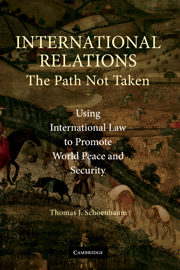Book contents
- Frontmatter
- Contents
- Preface and Overview
- 1 Introduction: Two Very Different Wars in Iraq
- 2 The Twenty-First Century – The End of History or a New Beginning?
- 3 International Power Politics
- 4 A New Global Order Based on International Law and Multilateralism
- 5 Peace and Security: Reinventing the United Nations
- 6 International Political Economy
- 7 International Environmental Protection
- 8 International Human Rights
- 9 International Crimes
- 10 Conclusions
- Index
- References
9 - International Crimes
Published online by Cambridge University Press: 23 July 2009
- Frontmatter
- Contents
- Preface and Overview
- 1 Introduction: Two Very Different Wars in Iraq
- 2 The Twenty-First Century – The End of History or a New Beginning?
- 3 International Power Politics
- 4 A New Global Order Based on International Law and Multilateralism
- 5 Peace and Security: Reinventing the United Nations
- 6 International Political Economy
- 7 International Environmental Protection
- 8 International Human Rights
- 9 International Crimes
- 10 Conclusions
- Index
- References
Summary
In the summer of 2002, the International Criminal Court (ICC) began working in The Hague, Netherlands; its work was accepted by 97 nations, but not the United States. For the first time the world has in operation a permanent court that can try individuals who commit international crimes. Why is this needed? Why is the United States standing down? Could the ICC become an effective weapon in fighting the world war against terror?
ORIGINS
The concept of international crime as distinct from national criminal activity grew out of a recognition that (1) war crimes were offenses for which the individuals who commit them should be responsible; (2) the definition and elements making up such a crime were a matter of international, not national, law; and (3) in some cases at least, the individuals accused of such crimes should be tried by an international rather than a national court or tribunal.
These three issues were confronted for the first time at the end of World War II. Many of the events of that war were considered to have far exceeded the bounds of the norms of warfare solemnly agreed to in multilateral treaties, notably the international humanitarian law rules agreed in The Hague conferences in 1899 and 1907 (see Chapter 8) and the Kellogg-Briand Pact (see Chapter 4) outlawing aggressive war.
- Type
- Chapter
- Information
- International RelationsThe Path Not Taken, pp. 285 - 301Publisher: Cambridge University PressPrint publication year: 2006



